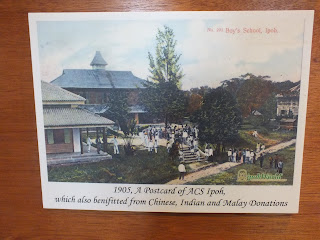Unhealthy air affects everyone’s well-being
By CHERYL HEW and EDMUND NGO
metroperak@thestar.com.my Photos by RONNIE CHIN and CHERYL HEW

Air pollution: People walking in front of the Ipoh railway station that is covered by the haze.
THE haze may seem like a health concern for those with weak respiratory system because of the airborne chemicals and particular matter in the air, but its effects extend far beyond that.
The Star spoke to lung, eye and skin specialists in the city to find out how the current haze affects people with varying pre-existing health conditions.
Cardiologist Datuk Dr Mah Hang Soon said heart patients were not immune to the effects of haze, despite many thinking that it only affects those with weak lungs.
“Heart patients need to realise that everyone is affected by the haze as it is a form of air pollution, with many small particles being spread through the air.
“The particles could affect one’s cardio-pulmonary system, causing breathing difficulties or obstructive airway diseases,” said Dr Mah.
He added that heart patients could face lack of oxygen supply to their heart, which would lead to heart complications.
“I advise heart patients to avoid crowded places or open spaces as they could inhale pollutants in the air.
“Apart from avoiding exposure to these places unnecessarily, they also need to drink a lot of water and wear proper masks that can block the particles,” he said.
Dr Mah added that heart patients should seek medical attention immediately if any symptoms, such as of shortness of breath or other complications appear.
Perak Chest Society president and chest physician Dr Leong Oon Keong stressed that those with pre-existing respiratory conditions must take extra precaution during this haze season.
“When the Air Pollutant Index (API) reaches a certain level, the amount of smoke and other airborne particles can clog up lungs and cause harmful reactions.

Testing the lungs: Dr Leong watching as his clinic physiotherapist Azmeera Muhammad undergoes a lung function test at his clinic in Jalan Pasir Puteh, Ipoh.
“The effect is especially bad on patients with chest problems such as asthma, tuberculosis, chronic obstructive pulmonary disease (smoker’s lung) and lung cancer,” Dr Leong said.
Dr Leong, who has been practising thoracic medicine for 22 years, said patients must continue to take their medication and see their doctors if their symptoms worsen.
“Avoid going outdoors and exercising, because exercise causes more air to be exchanged in the lungs and the haze would deposit more harmful particles there.
“If you have to go outdoors, wear protective face masks to minimise the effects of the haze,” he advised.
Lee Eye Centre chairman Datuk Dr Y.C. Lee said his specialist centre usually saw an increase in number of patients with conjunctivitis and other related problems when the weather turns hazy.
“While those with no prior eye problems can also face problems with the haze, it is those with allergic tendencies that are most severely affected.
“The particulate matter gets into their eyes and causes inflammation, watery eyes and other symptoms.
“To avoid this, they should stay indoors when the API reaches hazardous levels and use artificial tears and eye drops as needed,” said Dr Y.C. Lee.
Centre medical director Dr Lee Mun Wai said those wearing contact lenses were also more prone to experiencing adverse effects in hazy weather.
“Many contact lenses companies advertise their products as being comfortable and painless, but contact lenses are still considered as foreign objects in the eyes.
“Many who wear contact lenses do not take them off for prolonged periods of time, so the sensation of wearing the lenses and facing the haze at the same time may very well lead to a lot of discomfort and irritation in the eyes,” he said.
Even those with skin problems are not spared from the effects of haze, said dermatologist Datuk Dr Sushil Kumar Ratti.
“The haze and hot weather does not cause skin problems, but they certainly aggravate pre-existing conditions such as eczema and atopic dermatitis.
“The heat and temperature changes irritate skin and causes it to itch easily. This makes patients feel extremely miserable and can affect their sleep and lead to other problems,” he said.
Dr Sushil said avoidance was the best prevention method and advised eczema patients to follow Government directives and stay indoors.
“Use moisturiser as you see fit, but if symptoms persist, consult your dermatologist, who can prescribe oral or topical medication as needed,” he said.













